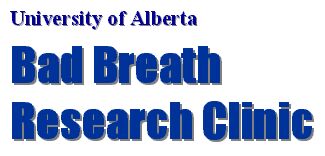University of Alberta Bad Breath Research Clinic
Dr. F.-Michael Eggert, DDS, Cert. Periodont., MRCD(c), MSc, PhDcantab
e-mail: feggert@ualberta.ca


University of Alberta Bad Breath Research ClinicDr. F.-Michael Eggert, DDS, Cert. Periodont., MRCD(c), MSc, PhDcantab |
|
|
|
Some Facts about Bad Breath (Halitosis): Bad Breath is an Ancient Concern! |
|
Causes:
Action Step1:
Action Step2:
|
|
|
Research |
Our main research objective is to develop better methods for monitoring:
|
If you have specific questions about bad breath please send me an e-mail.
This is an area of tremendous interest, but a lot of the necessary research remains to be done!
NOTE: I cannot recommend specific products or specific clinicians.
© 1996 - 2004 Dr. F-Michael Eggert, my material is copyright with all rights reserved.
Last updated on 08/Sep/2004
You are visitor number ![]()
Since 01/01/98.